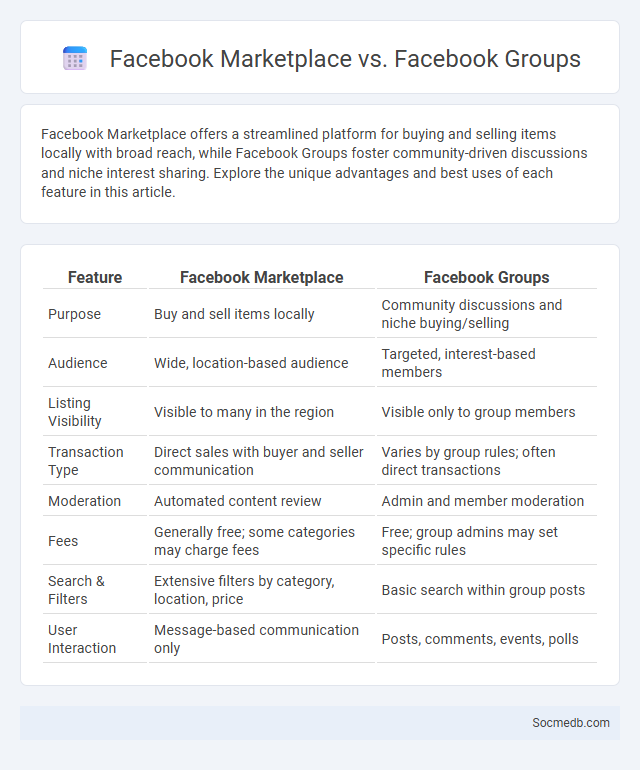
Photo illustration: Facebook Marketplace vs Facebook Groups
Facebook Marketplace offers a streamlined platform for buying and selling items locally with broad reach, while Facebook Groups foster community-driven discussions and niche interest sharing. Explore the unique advantages and best uses of each feature in this article.
Table of Comparison
| Feature | Facebook Marketplace | Facebook Groups |
|---|---|---|
| Purpose | Buy and sell items locally | Community discussions and niche buying/selling |
| Audience | Wide, location-based audience | Targeted, interest-based members |
| Listing Visibility | Visible to many in the region | Visible only to group members |
| Transaction Type | Direct sales with buyer and seller communication | Varies by group rules; often direct transactions |
| Moderation | Automated content review | Admin and member moderation |
| Fees | Generally free; some categories may charge fees | Free; group admins may set specific rules |
| Search & Filters | Extensive filters by category, location, price | Basic search within group posts |
| User Interaction | Message-based communication only | Posts, comments, events, polls |
Introduction to Facebook Marketplace and Facebook Groups
Facebook Marketplace provides a dynamic platform for users to buy and sell products locally, leveraging Facebook's vast user base to connect buyers and sellers seamlessly. Facebook Groups foster communities centered around shared interests, allowing members to engage in discussions, share resources, and organize events within private or public settings. These features enhance user interaction by creating targeted spaces for commerce and community engagement on the Facebook platform.
Key Features of Facebook Marketplace
Facebook Marketplace offers a user-friendly platform for buying and selling items locally, leveraging Facebook's vast network of millions of active users for greater reach. Key features include advanced search filters by location, category, and price, secure messaging between buyers and sellers, and integration with user profiles to build trust. You can easily discover unique deals, list items with photos and detailed descriptions, and manage transactions efficiently within the Facebook app.
Key Features of Facebook Groups
Facebook Groups offer robust community-building tools allowing you to connect with like-minded individuals through shared interests or causes. Key features include customizable privacy settings, enabling your group to be public, closed, or secret, which helps control member access and content visibility. Advanced moderation tools such as post approval, member screening, and detailed analytics empower you to manage engagement and foster a safe, interactive environment.
Buyer and Seller Experience Comparison
Buyer experience on social media platforms is enhanced through personalized recommendations, seamless communication channels, and integrated payment options, making the purchasing process efficient and engaging. Sellers benefit from targeted advertising tools, detailed analytics, and direct customer feedback, enabling precise market segmentation and rapid product adjustments. Both parties experience increased interaction speed and transparency, fostering trust and driving higher conversion rates in social commerce environments.
Safety and Security Measures
Protecting Your personal information on social media platforms requires strong security measures like two-factor authentication and regular password updates. Monitoring privacy settings and being cautious with friend requests reduces the risk of identity theft and cyberbullying. Using trusted security software and staying informed about platform policies enhances Your overall online safety.
Item Listing and Discovery Differences
Social media platforms vary significantly in item listing and discovery features, with marketplaces like Facebook Marketplace offering structured listings complete with categories, prices, and seller ratings, facilitating efficient product searches. Instagram emphasizes visual discovery through hashtags, influencer posts, and shopping tags integrated within Stories and Reels, enhancing organic product exposure. TikTok's algorithm-driven For You Page promotes viral item discovery by highlighting trending products and user-generated reviews, creating a dynamic shopping experience distinct from traditional listing-based models.
Community Engagement and Trust
Social media platforms facilitate community engagement by enabling real-time interactions, fostering meaningful conversations, and promoting user-generated content that enhances trust among members. Algorithms prioritize authentic, transparent communication, which strengthens relationships and encourages active participation. Consistent responsiveness and credible information sharing build a loyal community and improve overall trustworthiness on social networks.
Pros and Cons: Marketplace vs Groups
Social media marketplaces offer a streamlined platform for buying and selling with broad audience reach, enhancing visibility and sales opportunities. In contrast, groups foster niche communities that encourage trust, personalized interactions, and targeted engagement but may limit exposure to a smaller audience. Understanding the balance between broad market access in marketplaces and the intimate, focused environment of groups is essential for optimizing social commerce strategies.
Which Platform is Better for Your Needs?
Choosing the best social media platform depends on your specific goals, whether it's brand awareness, customer engagement, or lead generation. Instagram excels in visual storytelling and influencer marketing, while LinkedIn is ideal for B2B networking and professional content. You should analyze your target audience demographics and content style to determine which platform aligns best with your needs.
Final Verdict: Choosing the Right Facebook Selling Option
Choosing the right Facebook selling option depends on your business goals, product type, and target audience. Facebook Shops offers a seamless storefront for You to showcase multiple products, while Marketplace focuses on local and individual sales with less setup. Evaluate factors like ease of use, audience reach, fees, and integration with other platforms to ensure the most effective approach for maximizing sales and customer engagement.
 socmedb.com
socmedb.com